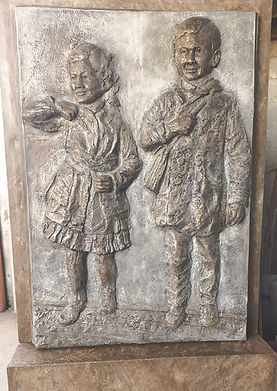Francisco Maestas claimed that his children had a quality education at the school they attended in the district of Alamosa, Colorado, when the school administration insisted that he send them to the Mexican School.
The year was 1914, and Maestas fought the district in court and won. Experts say it was one of the country's first successful cases of school desegregation, and the oldest known so far involving Mexican Americans.
After decades of history being forgotten, a three-dimensional sculpture depicting the Maestas children has been installed on the State Capitol in Denver, in honor of the 108th anniversary of the ruling in the case. The statue will still travel to other parts of the state.
According to
Caso Maestas website, “In 1912, Hispanic children of Alamosa were forced to attend a separate school from white children. The Alamosa School Board at the time argued that the Hispanic children needed language support and they should attend classes taught in Spanish in their own school building, even though most Spanish speaking children were fluent in English”.
Despite a blatant case of racial prejudice, the school board argued that since Mexicans were considered white, there could be no racial discrimination, and that students would be separated based on their language skills. However, during the trial, the families proved the school district wrong, and several children, including Miguel Maestas, demonstrated their fluency in the English language.
The judge's favorable decision to allow Mexican American children the right to attend public schools near their homes or of choice in the Alamosa district, made local headlines at the time. The story, however, was forgotten for over a hundred years, according to
NBC News.
“Decades later, Gonzalo Guzmán, a visiting assistant professor of educational studies at Colgate University, came across a reference to the Maestas case in an archived Wyoming newspaper. Intrigued, he consulted the original court documents, and he and several colleagues published their findings in an academic journal in 2017. […] Guzmán said Latinos are often left out of conventional American history scholarship”, according to the NBC publication.
“Scholars say the case is important because it offers evidence of the history of Latino advocacy, especially of how parents fought for their children’s right to education. It can also be seen as relevant today given the controversies over ethnic studies programs and critical race theory”.
In 2020, the Colorado Senate passed a resolution recognizing the importance of the Maestas case. Rubén Donato, a professor of education at the University of Colorado Boulder, hopes the commemoration leads to greater public awareness, and that Mexican Americans may have filed more lawsuits in the past that simply weren't discovered and scrutinized.
According to NBC News, Alamosa County is currently home to about 16,000 people, 47% of whom identify as Latino. Some residents say inequality persists in the area.
 maestascase.com
maestascase.com











